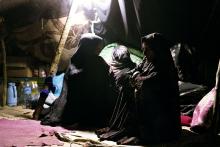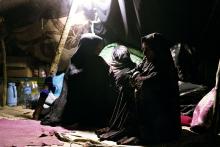“I was overjoyed”, she says, but joy turned to panic when she found she had no blankets to cover her firstborn. “My baby began to weaken gradually, and a bluish colour started appearing around her mouth. Eventually, my newborn’s breath was taken away by the extreme cold, and I, who had just held my beloved in my arms, lost her forever”.
Hanifa is among the thousands of women whose lives have been marked by tragedy since three major earthquakes and their aftershocks rocked western Afghanistan’s Herat province.
Most of the casualties have been concentrated in four villages in Zenda Jan, where nearly 100 per cent of 1,300 houses in the region were toppled. Across the western region, more than 1,384 are estimated to have died and 1,853 have been injured. At least 1,714 homes across the country have been destroyed.
Due to the virtual gender apartheid imposed by the Taliban, which has trapped countless women inside their homes, the death toll and injuries have been higher among women and girls. Women represented 58 per cent of adults killed in the earthquakes and constitute 60 percent of those injured and 61 per cent of those missing as of 19 October.
Sima, a young mother from the Zenda Jan village of Ghar-Moshak, barely had enough food before the earthquake, and has now lost her husband and 3-year-old daughter. She escaped her collapsing home with her two youngest children, but now feels consumed by despair.
“Losing a child is the most penetrating pain I have ever experienced,” she lamented. “I wanted the mountains and the sky to know that a part of me had died.”
“In Afghanistan, where women’s rights including their freedom to move has been so significantly curtailed, this has created a perfect storm with devastating impacts”, said Alison Davidian, UN Women’s Representative in Afghanistan.
“The majority of persons killed, injured, or missing as a result of the Herat earthquakes were women – trapped inside their homes as a result of increasing restrictions”, she added, noting that research shows that women and girls are disproportionately exposed to risk during disasters and their aftermath, including increased loss of livelihoods, security, and even their lives.
Women and girls may also have been left more vulnerable because they could not obtain information on earthquake preparedness due to restrictions imposed on their rights and mobility, according to a Gender Alert produced by the UN’s national and regional Gender in Humanitarian Action Working Groups and the Women Advisory Group to the Humanitarian Country Team in Afghanistan.
In that report, women and girls unanimously said that they faced major protection concerns in the aftermath of the earthquakes, and 63 per cent said they lacked safe access to latrines. Restrictions imposed on women humanitarian workers are also preventing many women from accessing aid. Women first responders and health workers in Herat’s regional hospital have highlighted insufficient food, soap, underwear, and menstrual hygiene products.
A second Gender Alert report, based on six focus-group discussions with women in affected communities as well as reports from women’s organizations and humanitarian actors in Herat, recommended that earthquake responses better address gender, including by listening to women’s needs and by selecting women volunteers to ensure that assistance reaches the most vulnerable.
As part of a team of five UN agencies, UN Women staff recently travelled to the Herat village of Parwan to survey the destruction and speak with affected women.
There, an elderly woman caring for a family of 21, mostly women and young children, cried in desperation and called on God to look out for her and her family considering the coming winter. They had limited food, and their tents made from blankets and sheets were not able to withstand strong winds, she said.
The earthquakes are also expected to worsen the mental health crisis afflicting Afghan women. Even before the quakes, 89 per cent of women from western Afghanistan said their mental health had worsened between April and July 2023.
Women-headed households, unaccompanied minors, and unaccompanied elderly are being relocated to a camp in Herat City following the earthquakes. Given the discrimination against women in Afghanistan, it is likely that they will experience more difficulty than men at the camps when accessing food distribution services, hospitals, and other emergency relief efforts.
Such is the case for now-widowed Sima, who shares: “In an instant, I have lost everything. And there is no protection for me. Now, I have two children, aged two months and one and a half years, and a world of despair with the images of the earthquake burned into my memory.”

